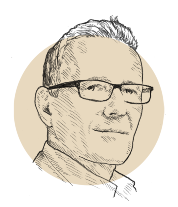Shortly before his death in 2016, Italian semiologist and novelist Umberto Eco, author of the renowned The Name of the Rose, sadly remarked: “Social media gives legions of idiots the right to speak when they once only spoke at a bar after a glass of wine, without harming the community. Then they were quickly silenced, but now they have the same right to speak as a Nobel Prize winner.”
A true scourge of our times, this way of speaking about subjects in which we have no expertise has a name: ultracrepidarianism. In Belgium, it was voted word of the year in 2021 following a survey organized by daily newspaper Le Soir and the national radio and television network RTBF, in partnership with the University of Louvain.
This strange term comes from a Latin expression, sutor, ne supra crepidam, meaning “shoemaker, not beyond the shoe.” We have to look back to Ancient Greece in the 4th century B.C. to understand its true origins. Pliny the Elder, a Roman writer in the 1th century A.D., recounted that the painter Apelles of Kos, a contemporary of Alexander the Great, was busy in his workshop when his shoemaker pointed out a mistake in the depiction of a sandal. The artist accepted the criticism and made adjustments to his painting that night. The following day, pleased to notice that Apelles had listened to him, the shoemaker offered another remark, this time about the leg. This is when the painter replied – in Greek, of course – with the expression mentioned above. Today, it has become a proverb used to lambast those who are quick to make categorical observations on subjects they know little – or nothing – about. In other words, “stick to what you’re good at.”
It should be noted that class discrimination was part of the story told by Pliny. In Latin, sutor describes a shoemaker, but also a man of the proletariat. The term ultracrepidarianism itself appeared much later: It was coined in 1819 by English writer William Hazlitt (1778-1830), who was frustrated by sweeping judgements made by a literary critic. Meanwhile, supra (above) was replaced by ultra (further or beyond).
It was not until 2014 that the word emerged in France, which is hardly surprising. In the early 2000s and with the rise of the Internet, everybody began thinking they could give their opinions as if they were definitive conclusions, whether about nuclear power, GMOs, or even more technically complex subjects. But this was just the beginning – an appetizer, if you will. Since the start of the current public health crisis in 2020, everyone has developed their own analysis of the origin of Covid-19, the factors determining contamination, and the effectiveness of vaccines. Often, with the preface, “I’m not a doctor or a researcher, but…”
While its meaning is quite clear, the describer “ultracrepidarian” does have a synonym: everythingologist. This refers to someone who gives their opinion on everything and who presents themselves as an expert in all fields, despite not having the required credentials. All it takes is one look at a smartphone or a cable news channel – where everythingologists and ultracrepidarians are often the ones calling the shots.
“Ignorance more frequently begets confidence than does knowledge.” This was Charles Darwin’s take on the affliction more than a century ago, in 1891. Backed by new developments in psychology, French neuropsychiatrist Boris Cyrulnik stated that “ignorance causes such a state of confusion that we cling to any explanation in an effort to feel a little less embarrassed. This is why the less we know, the more certain we are.”
And long before this eminent intellectual, in the 5th century B.C., Greek philosopher Socrates is thought to have said something that we should all keep in mind: “The more I know, the more I realize that I know nothing.”
Article published in the May 2022 issue of France-Amérique. Subscribe to the magazine.












